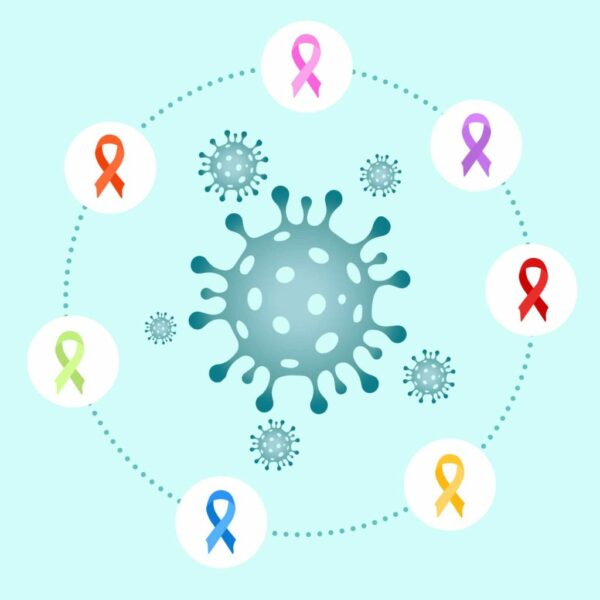We asked students with chronic illness what helped them in their journey.
BLOOD CANCERS LIKE LEUKEMIA MAY LEAD TO MORE SEVERE CASES OF COVID-19 THAN OTHER KINDS OF CANCER
BLOOD CANCERS LIKE LEUKEMIA MAY LEAD TO MORE SEVERE CASES OF COVID-19 THAN OTHER KINDS OF CANCER
September 17, 2020
Kelsey Kloss

Learn more about our FREE COVID-19 Patient Support Program for chronic illness patients and their loved ones.
You may already know that individuals with cancer have a higher risk of COVID-19 complications, according to the U.S. Centers for Disease Control and Prevention, which maintains a list of medical conditions associated with an increased risk of severe illness from COVID-19.
A new study now provides additional insight into the risk factors of hematologic cancers (also known as blood cancers), which begin in blood-forming tissues like bone marrow or immune system cells.
Adult patients with blood cancer, such as leukemia, lymphoma, and myeloma, had a 57 percent higher risk of getting severely ill if they were diagnosed with COVID-19 compared to cancer patients with solid organ tumors such as breast cancer, reported an August study published in the journal The Lancet Oncology. They were significantly more likely to require high-flow oxygen, non-invasive ventilation, and intensive care unit admission for ventilation.
To gather these results, researchers studied 1,044 patients enrolled in the UK Coronavirus Cancer Monitoring Project cohort between March 18 and May 8. The participants had a median age of 70 years and 57 percent were men.
Leukemia patients, in particular, were twice as likely to die from COVID-19 than other participants. The immune system disruption leukemia patients experience and their type of cancer treatment may be partly why they’re at risk for getting infected with COVID-19 and experiencing severe consequences like multi-organ failure, note the researchers.
Patients with blood cancers who had recent chemotherapy were also twice as likely to die during COVID-19 hospitalization.
Age also played an important role. Patients ages 80 or older were nearly five times more likely to die from COVID-19 than those ages 40 to 49.
Blood cancer patients in the coronavirus cohort were overrepresented when compared to those in the general population, which may suggest an increased susceptibility in these individuals to viral infection, according to the researchers.
Overall, more research on this patient population is needed. The study authors note that previous studies observing the link between blood cancers and fatality rate in COVID-19 patients have both supported and contradicted this study’s results.
Blood cancers are typically the result of excessive reproduction of white blood cells, and are more common in men than women, per Yale Medicine. The risk factors for blood cancers are not fully understood, but experts believe a combination of genetic and environmental factors may play a role. Smoking, radiation, and exposure to certain chemicals have all been linked to higher risk of certain types of blood cancers.
Get Free Coronavirus Support for Chronic Illness Patients
Join the Global Healthy Living Foundation’s free COVID-19 Support Program for chronic illness patients and their families. We will be providing updated information, community support, and other resources tailored specifically to your health and safety. Join now.
Blood Cancers: Symptoms, Diagnosis and Treatment. Yale Medicine. September 2, 2020. https://www.yalemedicine.org/conditions/blood-cancers.
Lee Lennard YW, et al. COVID-19 prevalence and mortality in patients with cancer and the effect of primary tumour subtype and patient demographics: a prospective cohort study. The Lancet Oncology. August 24, 2020. doi: https://doi.org/10.1016/S1470-2045(20)30442-3.
People with Certain Medical Conditions. Coronavirus Disease 2019 (COVID-19). U.S. Centers for Disease Control and Prevention. August 14, 2020. https://www.cdc.gov/coronavirus/2019-ncov/need-extra-precautions/people-with-medical-conditions.html.
SUBSCRIBE TO GHLF
RELATED POST AND PAGES
_
Was this article helpful?
YesNo




